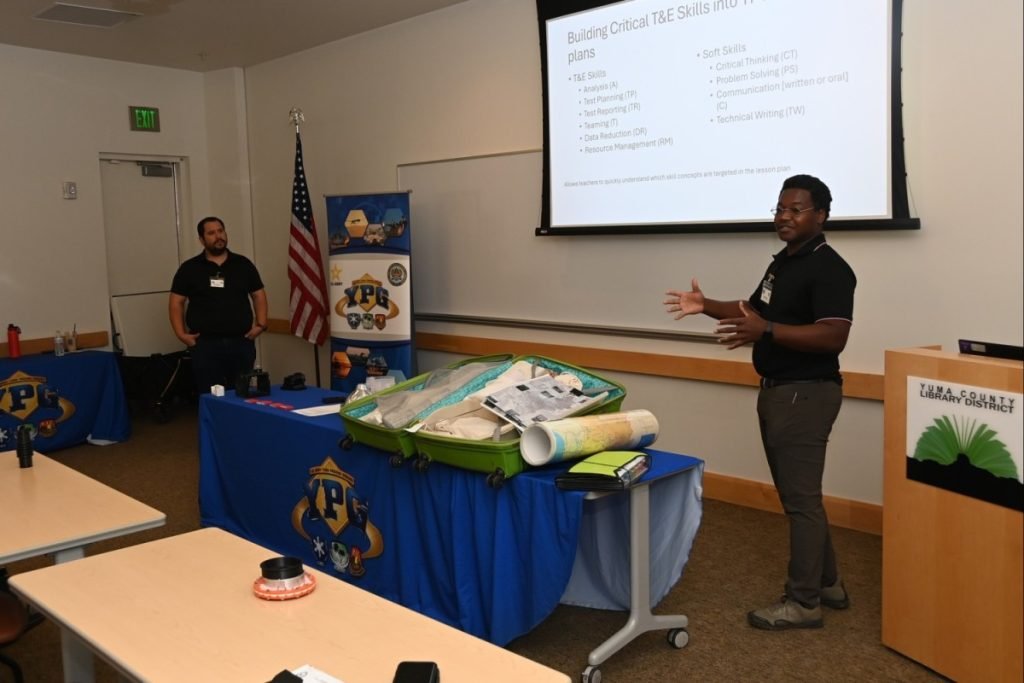U.S. Army Yuma Proving Ground (YPG) Development Director Gary Rosine (right) speaks during a public presentation of Science, Technology, Engineering and Math (STEM) kits for educators at the Yuma County Library Main Branch, May 9, 2024. YPG Test Officer Jose Ramirez (left) looks on. “The 3D printed kits are more aligned with the test and evaluation community and what YPG does,” Rosine said. “We're focused on engineering design, the evaluation process, statistical analysis and material properties.”
(Photo by Marc Schauer)
View Original
Careers are often a matter of chance and inspiration rather than destiny.
That’s why U.S. Army Yuma Proving Ground (YPG)’s various outreach efforts encourage local youth to pursue careers in science, technology, engineering and mathematics (STEM) fields and ultimately join the workforce.
“We're trying to get more outreach and community engagement and develop future generations of scientists, engineers and innovators,” said YPG STEM outreach coordinator Janet Rios. “We want to give these students growth and encouragement in the STEM fields.”
YPG's outreach efforts in this area have become a model for the entire Army Test and Evaluation Command. Over the past year, YPG has signed education partnership agreements with Arizona Western College, Desert Research Institute and the University of Arizona. Through the University of Arizona, YPG personnel have engaged with the Arizona Department of Education and the Yuma County Superintendent's Office.
“I pitched the idea of doing a pilot program to distribute STEM kits to high schools and eventually to younger students,” said Todd Hudson, YPG Technology and Investment Director. “This is an initial effort to gauge interest from local high schools. If there is interest, we hope to get kits into classrooms at least once a quarter.”
Toward this end, YPG staff involved in STEM outreach hosted a public presentation of the STEM kits for educators at the Yuma County Library Main Branch in early May.
“We're seeking the cooperation of school districts to make sure we're aligning with the Arizona curriculum and understand what the teacher perspective is,” Rios said. “Would they want us to come inside their schools or would they be comfortable with us developing our own kits?”
Participants viewed existing kits developed by the Desert Institute for desert riparian zones, as well as components of a 3D printing kit currently being developed by YPG for high school sophomores, and a kit for elementary school students being developed through YPG’s STEM Outreach Program.
“The 3D printing kit is more in line with the testing and evaluation community and what YPG is doing,” said Garry Rosene, head of development, “with its focus on engineering design, evaluation processes, statistical analysis and material characterization.”
Three additional kits from the Army Educational Outreach Program for testing modified electric vehicles, solar energy and a catapult design kit were also discussed.
“We want students to do hands-on experiments, get them interested in math and science, and then we want them to do tests and evaluations and understand why it's important to the Department of Defense and why they need these skills to be examiners, radar technicians or financial managers,” Hudson said.
The kits add to YPG’s already robust STEM outreach programs, which include well-received programs such as the annual “Enhancing Math and Science Education” summer science camp, which attracts 80 local students in grades 6-8 each June.
“My department is a development department, and we're helping YPG fulfill their mission for the future, and part of that mission is the future workforce,” Rosen said. “Getting more young people excited about STEM is really what we need to do.”







